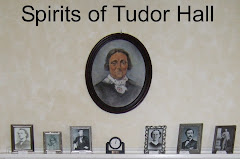Tuesday, March 4, 2014
Junius Brutus Booth Rescued From a Watery Grave
Wednesday, March 6, 2013
Share Your Love of History—Become a Volunteer
Monday, March 19, 2012
Spirits of Tudor Hall Invites You to Join Us in the Adventure and Romance at Tudor Hall
Ever since we first organized in 2008, Spirits of Tudor Hall has been in the business of taking something old (Tudor Hall) and creating something new (our tours and our growing sense of team spirit). Not only do we work hard but we have fun as we work together to explore and share the history of Tudor Hall and the Booth family.If you enjoy “pitching in” and using your skills and knowledge to make things happen, Tudor Hall just might be the place for you. A few of the “jobs” currently available are described below. Take a look at the list. If you don't find anything that fits your skills and interests, feel free to write and contact us with your own job description.
If you wish to volunteer, please contact us with information about your skills, experience, and qualifications and explain how you can put them to work on behalf of Tudor Hall.
Storytellers
We invite anyone with a talent for storytelling to audition to bring to life the story of Tudor Hall and those who have lived there while guiding visitors through the house.
Oral Historians
There are many people in the community who have been associated with Tudor Hall over the years. It is important to collect and record the memories of these individuals. If you enjoy interviewing and photographing people and/or if you are skilled with a tape recorder or video camera and would like to help capture the oral history of Tudor Hall, please let us know.
Tudor Hall Speakers Bureau
To meet requests from community organizations and schools, Spirits of Tudor Hall needs people with a talent for public speaking to tell the story of Tudor Hall at local meetings and events and in local classrooms. Actors, re-enactors, and storytellers with experience at Tudor Hall may be interested in participating in community outreach of this kind.
There are no membership requirements or dues at the current time beyond participating in whatever way suits you best. However, we are proud to introduce the organizations that support Spirits of Tudor Hall. Memberships are available at: The Center for the Arts, The Historical Society of Harford County, and The Junius B. Booth Society. For more information about becoming a volunteer or member of any of these organizations, please call us at 443-619-0008 or spiritsoftudorhall@gmail.com.
Thursday, March 15, 2012
The Gift of the Skull

Junius Brutus Booth was known for his acts of kindness. In "Booth Memorials. Passages, Incidents, and Anecdotes in the life of Junius Brutus Booth (the elder)" by Asia Booth Clarke, are a few examples:
Junius Sr. indulged his philanthropic desire unrestrainedly, and the particulars of some charitable visit or donation would frequently be disclosed to the family by the recipient.
My earliest recollection of my father is seeing him upon his knees, before a rough sailor, who had asked alms at the door. The poor fellow had a bad wound on his leg, which was suffering neglect, and my father brought him into the house and washed and bandaged the wound for him with the tenderest care.
These little deeds of kindness were almost daily occurrences. He thus sought to impress upon our minds these lessons of humanity to man and beast, more by his own acts than by precept. He delighted to seek out the destitute and unfortunate, and aid by his sympathy as well as his bounty.
It was on one of these errands of mercy that the horse thief, Fontainne, alias Lovett, was pointed out to him. Lovett was then confined in the Louisville jail, and it was remarked that he had no means of obtaining counsel, and my father, although being assured that his case was hopeless, sent him a lawyer and defrayed the expenses; for which kindness, when Lovett heard of it, he bequeathed him his head, desiring "that it should be given, after his execution, to the actor Booth, with the request that he would use it on the stage in Hamlet, and think when he held it in his hands of the gratitude his kindness had awakened."
The skull was accordingly sent to my father’s residence while he was absent from the city; and my mother, finding what a horrible thing had been left in her house, immediately returned it to the doctor to whom it had been entrusted for preparation and delivery. In 1857, the doctor, who had retained the skull, sent it to Edwin Booth, who used it in the grave-yard scene in "Hamlet" on several occasions, and afterward had it buried.



